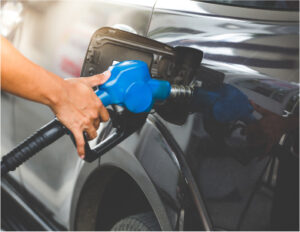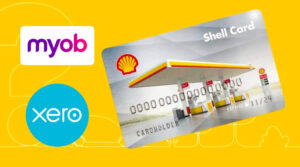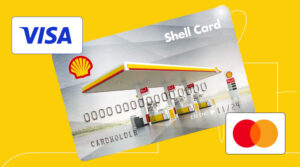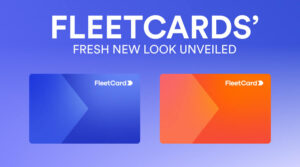TLDR: Best Fuel Cards at a Glance
- Most Widely Accepted: Fleet Card, with its vast network of nearly 6,000 fuel sites across Australia, is ideal for businesses with extensive travel needs.
- Best for Newer Businesses: Shell Card offers friendly terms for businesses with less than 12 months of financial history, making it easier to manage fuel expenses from the start.
- Best for Tradies: Motorpass is perfect for tradespeople with a small fleet, offering wide acceptance and comprehensive reporting for easy expense management.
- Best for Transport & Logistics: AmpolCard provides significant savings and efficient fleet management tools, tailored for the transport and logistics sector.
What is a Fuel Card?
A fuel card is a payment card specifically designed for the purchase of fuel. It streamlines expense reporting and management by consolidating fuel and vehicle maintenance costs into one account, offering real-time insights and detailed reporting.
Best Fuel Cards for Small Businesses
Most Widely Accepted Fuel Card – Fleet Card
If your business vehicles travel across Australia and you need access to a range of fuel stations, Fleet Card is your solution, accepted at 90% of fuel sites nationwide. Fleet Card covers nearly 6,000 multi-branded fuel stations and over 6,000 non-fuel partners like repair centres and dealerships.
Why It Stands Out:
- Broad Acceptance: Ideal for businesses with vehicles that cover large areas, ensuring fuel is always accessible.
- Volume Discounts: Negotiate better rates for large fleets, making it cost-effective.
- Simplified Management: Offers a single tax invoice for all transactions, streamlining your bookkeeping.
- Enhanced Cash Flow: Up to 51 days of interest-free credit can significantly improve your business’s cash flow.
- Additional Benefits: Access discounts on non-fuel purchases, including maintenance services and parts, plus promotional fuel discounts at Shell and Coles Express stations.
Considerations:
- New businesses under 12 months may face challenges due to strict credit checks.
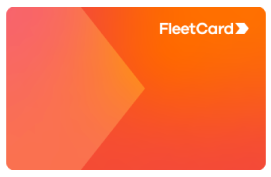
Save up to 5c per litre on fuel for your business
Best Fuel Card for Newer Businesses – Shell Card
New businesses often struggle to get fuel cards due to a lack of financial history. The Shell Card offers a solution with more flexible credit terms, making it easier for new businesses to get started.
Why It Stands Out:
- Wide Acceptance: Useable at over 1,250 sites across Australia, including new additions.
- Rewards: Earn Flybuys points at Shell Coles Express locations.
- Customer Satisfaction: Rated highly for customer satisfaction, ensuring a positive experience.
- Extra Services: Includes car washes and roadside assistance, adding value beyond fuel purchases.
Considerations:
- Designed to support newer businesses with shorter credit terms initially, which can be extended as your credit history improves.
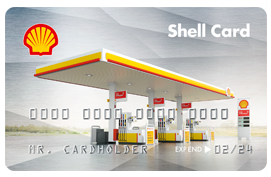
Save 6c/l + $0 card fees in promo period
Best Fuel Card for Tradies – Motorpass
Tradies with a small fleet need a fuel card that’s easy to manage. Motorpass is accepted at over 93% of service stations and provides access to over 6,000 non-fuel shops for vehicle-related expenses.
Why It Stands Out:
- Comprehensive Acceptance: Great for tradies who travel frequently to various job sites.
- Saves Time and Money: Reduces paperwork and simplifies expense management.
- Detailed Reporting: Offers itemised reports and captures essential details for fleet management.
Considerations:
- Cannot be used in conjunction with other loyalty programs, which might limit some savings opportunities.
Best Fuel Card for Transport & Logistics – AmpolCard
Time-sensitive industries like transport and logistics need efficient fleet management. The AmpolCard offers savings and a user-friendly online dashboard for tracking expenses.
Why It Stands Out:
- Exclusive Savings: Negotiated deals provide significant discounts on diesel fuel.
- Comprehensive Online Management: Easily track vehicle spending and maintenance online.
- No Transaction Fees: More savings with no extra fees for transactions.
Considerations:
- Limited to Ampol stations, which may affect usability in areas without these stations.
- Additional services come with monthly fees, so consider what you really need.
BONUS: Credit Cards with Fuel Benefits
A common question that often pops up is whether using a corporate credit card rather than a fuel card for your fleet is better. Depending on the credit card you choose, it’s certainly something to consider. After all, any arrangement that allows you to receive rewards for the necessary costs of running your business is always a plus!
Here’s a quick comparison to consider:
| Credit Cards | Fuel Cards |
|---|---|
| Allow your drivers to carry only one card for all their business expenses | Specifically designed for purchasing fuel for a fleet, rather than a credit card designed for entertainment purchases |
| The card will be accepted almost everywhere | Offer better fuel spending controls |
| Credit cards can offer rebates for a wide variety of expenses | Often provides reports with helpful data, such as fuel type, cost per unit, vehicle data, etc |
| If you use a credit card that offers frequent flyer miles, you can use those miles to cover your holidays, or offer trips as incentives for your team | Can provide information such as cost per km, km per litre. This information helps you to better manage fleet expenses |
| Can offer additional features such as travel insurance and interest-free periods | Fleet fuel costs are kept separate rather than lumped together with other expense data |
| Corporate card programs can be susceptible to fraud and cloning than fleet fuel cards, which used closed merchant networks | Fuel card offers you more control and allows you to impose spending limits |
Fuel Card Benefits for Small Businesses in Australia
Fuel cards are a game-changer for businesses that rely on vehicles, offering a suite of benefits designed to cut down on both operational costs and the time spent managing expenses. Here’s a closer look at how fuel cards can make a significant difference:
- Savings on Fuel: By using a fuel card, your business can tap into discounts for buying fuel in bulk, which means the more fuel you purchase, the less you pay per litre. This setup is especially beneficial for businesses with several vehicles, as it can lead to substantial savings over time. Additionally, by monitoring fuel consumption through detailed reports, you can identify ways to optimise usage and further reduce costs.
- Simplified Expense Tracking: One of the biggest headaches for businesses is keeping track of numerous receipts for fuel purchases. Fuel cards solve this problem by providing digital statements that log every transaction automatically. This means no more sifting through piles of paper to account for every fuel purchase, making it easier to manage your budget and prepare for tax time.
- Reduced Administrative Costs: The automated nature of fuel card reporting simplifies the reconciliation process, significantly cutting down on the administrative effort required to manage vehicle expenses. This automation not only saves time but also reduces the likelihood of errors in expense reporting, ensuring more accurate financial management.
- Enhanced Security: Fuel cards come equipped with security features like PIN codes and transaction monitoring. This adds a layer of protection against unauthorised use, as only designated employees can use the card. Furthermore, by tracking each transaction’s details, you can quickly identify and address any suspicious activity, substantially reducing the risk of fraud.
- Convenience: With fuel cards, there’s no need for employees to pay out of pocket for fuel and wait to be reimbursed. This streamlines the process for both employees and the accounting department, eliminating the need for reimbursement paperwork and improving cash flow management. Employees simply use the card at the pump, and the expenses are directly billed to the company account.
Tips for Choosing a Small Business Fuel Card
Fuel Station Coverage
The fuel card you choose must cover the petrol stations your fleet visits regularly. If there’s a particular brand you frequent, check if they offer a branded fuel card. For fleets using various brands, a multi-branded card is a smarter choice, offering flexibility and convenience no matter where your vehicles are.
Rewards
Consider if you’ll use the perks associated with the card, such as frequent flyer points. Remember, rewards offered by fuel cards often can’t be combined with other loyalty programs, so choose a card whose benefits you’ll fully utilise to ensure you’re getting the best value.
Security
Opt for a fuel card equipped with security features, like PIN codes, to safeguard against unauthorised use and fraud. This level of security is typically more robust than that of standard corporate credit cards, offering peace of mind and better protection for your business finances.
Pricing
Your fuel consumption can make you a more appealing customer to fuel providers, so don’t hesitate to negotiate prices. If you anticipate increased fuel usage, mention it during negotiations to potentially secure more favourable rates.
Control
A good fuel card system allows you to set spending limits and monitor transactions to prevent misuse. This capability is crucial for maintaining oversight of fuel expenses and preventing financial losses due to unauthorised spending by employees.
Fees
Evaluate the fee structure of each fuel card. While most cards charge a monthly fee, some offer no-fee options. Assess the fees against the benefits each card provides to determine which offers the most value for your business.
Volume of Your Fleet
The size of your fleet can influence the most suitable card option. Some cards are better for larger operations with many drivers, while others cater to smaller businesses. Be mindful of cards that charge per card, as this can add up for businesses with several part-time drivers.
Interest-Free Periods
Interest-free periods vary among cards, ranging from 14 to 51 days. A longer interest-free period can significantly aid your business’s cash flow management. Additionally, paying off the fuel card with a business credit card can extend your interest-free period further, allowing you to earn points and enjoy additional benefits.
Find The Right Fuel Card for Your Business
Keep your fleet running smoothly with the right fuel card. We’ve taken an in-depth look at Australia’s top fuel card options to help you find the best fit for your business. Each card offers different benefits, so there’s something for everyone. And if you’re also considering rewards, don’t overlook business credit cards. They might not give you detailed fuel spending reports, but they come with their own set of perks.
Remember: it’s important to read the fine print carefully. Make sure you understand all the fees involved, including annual fees and any charges at the pump.
At the end of the day, the best person to choose the right fuel card for your business is you. You know your fleet’s needs better than anyone. The ideal fuel card should be easy for your team to use, help you save money, and provide useful data to help your business grow.
